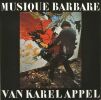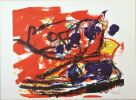3 books for « s appel ed »Edit
-
Topics
First edition (1)
History (1)
Music (1)
Theology (1)
-
Countries
Belgium (1)
France (2)
-
Syndicate
ILAB (1)
SLAM (1)
Gift and its Wages The Land of Israel and the Jewish People in the Spiritual Life of Medieval Russia,
Turnhout, Brepols, 2012 Hardback, approx. X+408 pages., 33 b/w ill., 2 b/w line art, 156 x 234 mm. ISBN 9782503534381.
An examination of Old Russia's dichotomous attitude towards the Jews and Jewish culture - the appropriation of the Old Testament and the concept of a 'Chosen' people and land juxtaposed with the subjugation of the Jews. Respect for the Old Testament and its heritage was an integral feature of Russian medieval culture and played a major role in determining Old Russia's value system and its attitude toward past and contemporary events. Jerusalem and the Holy Land were ideals, and the Chosen People and Old Testament heroes were role models and standards for both the past and the present. Yet, in its ongoing effort to be recognized as the 'New Chosen People' within the family of nations, Old Russia rejected 'the Other', that is the descendants of the 'Old Chosen People'. The almost total absence of Jews in Russia throughout the ancient period, along with the central role played by Jewish tradition in the development of its culture, are a contradiction. This book presents the story of this dichotomy during the Old Russian millennium, from its inception to the late seventeenth century. The material is organized chronologically, beginning with the creation of the Kievan state in the far reaches of the Khazar polity in the ninth century, and ending with the great transformation, the reforms of Peter the Great. This is preceded by a survey of two sources that shaped the image of the land and people of Israel in the erudite world of ancient Russia: a description of the Holy Land by Abbot Daniel in the early twelfth century, and the ancient Slavic translation of Josephus?s Wars of the Jews. Languages : English.
Musique Barbare
1963 disque Amsterdam , WVB-99954, 1963, album dos toilé contenant un disque vinyle 33trs 30cm, sous pochette illustrée et 28 pages avec les textes de Jan Vrijman et les photographies inédites d'Ed van der Elsken de la performance de Karel Appel. Edition originale.Les morceaux: Paysage électronique, Poème Barbare, Le Cavalier blanc.Appel a enregistré Musique barbare, chef-d'œuvre de la musique concrète, en 1963 à l'Instituut voor Sonologie des Pays-Bas avec la collaboration du compositeur Frits Weiland. Cet enregistrement a initialement été produit pour servir de bande-son à un documentaire sur Karel Appel réalisé par le cinéaste Jan Vrijman. Le résultat est un mélange étourdissant d'orgues électriques, de percussions et de tambours de bouilloire, assemblés et modulés avec un jeu de variations de vitesse de la bande sonore. Petits défauts à la pochette, disque en parfait état.Broken Musik p.87. Schraenen p.44. Visual Vinyl 94-95.(102579)
Phone number : +33 1 48 01 02 37
Musique barbare.
Disque vinyle, Album 33 tours, Philips, 1963. Karel Appel a enregistré Musique barbare en 1963 à l'Instituut voor Sonologie des Pays-Bas avec la collaboration du compositeur Frits Weiland. Édition accompagnée d'un livret de 30 pages de photographies inédites prises par Ed van der Elsken et de textes du cinéaste Jan Vrijman (en anglais). E.O.
 Write to the booksellers
Write to the booksellers





